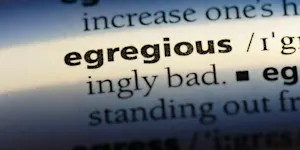What Makes This Word Tick
"Sisyphean" describes a task that seems endless and futile, much like the fabled story of Sisyphus, who was condemned by the Greek gods to roll a boulder up a hill, only to watch it roll back down again. This word evokes a sense of perpetual struggle without the hope of ever completing the task. It's a perfect vocabulary choice for those days when you're tackling never-ending chores, like laundry or weeding the garden.
If Sisyphean Were a Person…
Imagine Sisyphean as your adventurous neighbor who insists on a jogging route through the trickiest terrain—perpetually jogging uphill, yet seeming oddly content with their perennial loop. This person always smiles, even when a GPS mishap sends them back to square one. Their stubborn dedication is something admirable yet exhausting to witness.
How This Word Has Changed Over Time
Originally tied directly to the myth of Sisyphus, over time, "Sisyphean" has come to represent any endeavor that feels dauntingly infinite or pointless. The word has remained remarkably constant in its meaning, primarily due to its roots in a tale that has aged like fine wine—resonating as much with audiences today as it did in the time of ancient Greece.
Old Sayings and Proverbs That Use Sisyphean
While not commonly found in old proverbs, Sisyphean embodies the spirit of phrases like "spinning your wheels" or "going nowhere fast," where effort doesn't yield progress. It's the mythological equivalent to "beating a dead horse," but perhaps with a bit more classical charm.
Surprising Facts About Sisyphean
A fascinating fact about "Sisyphean" is its philosophical significance. Albert Camus’s essay "The Myth of Sisyphus" examines the absurdity of life through this myth, suggesting that there is a form of victory in embracing such futility. This gives "Sisyphean" a deeper, reflective layer beyond mere redundancy.
Out and About With This Word
In everyday settings, you might hear "Sisyphean" used to describe projects with endless red tape or goals that seem frustratingly out of reach. Think local mall redesigns meeting endless committee hiccups or repetitive citizen paperwork that never truly ends—these delightfully modern scenarios capture its essence quite well!
Pop Culture Moments Where Sisyphean Was Used
"Sisyphean" often pops up in TV shows or movies to describe the antagonist’s grand schemes or the protagonist's battle against an indifferent universe. Its appearances may not be obvious, but it perfectly labels the kind of battles faced by characters in dramas like "Breaking Bad" or mind-bending sci-fi like "Doctor Who."
The Word in Literature
You'll find "Sisyphean" cozying up in the pages of existentialist novels or used to punctuate the drudgery in stories about bureaucratic red tape. Authors who love a touch of mythology, like Neil Gaiman, may pepper their works with words like these to evoke a classically tragic tone.
Moments in History with Sisyphean
Think of historical moments like the construction of the Great Wall of China or the endless struggles faced by explorers in uncharted lands. These endeavors, often monumental in scale and effort, carried a Sisyphean spirit long before the word became part of our vocabulary.
This Word Around the World
The essence of "Sisyphean" is mirrored in many cultures. In Japan, a similar sentiment might be captured by the story of Tanabata, where star-crossed lovers are separated by a river and can only meet once a year—a relentless cycle of longing and waiting that echoes the sentiment of endless toil.
Where Does It Come From?
The word "Sisyphean" is derived from Sisyphus, a character in Greek mythology. His eternal punishment for attempting to outwit the gods was to push a boulder up a hill, only for it to roll back down each time he neared the top—an allegory for life's futile struggles.
How People Misuse This Word
Some people mistakenly use "Sisyphean" to describe any task or job that's simply tough or difficult. However, its real power lies in the futility, not just the hard work. It's all about toiling away with no end in sight, rather than just working up a sweat.
Words It’s Often Confused With
Herculean: While both involve struggle, Herculean implies overwhelming strength or effort, not futility.
Quixotic: More about idealistic but impractical pursuits—less about futility.
Laborious: Simply means requiring time and effort—not necessarily without end.
Additional Synonyms and Antonyms
Synonyms include futile, pointless, and never-ending. In contrast, antonyms would be rewarding, fruitful, or successful—tasks that come with satisfaction and a clear sense of completion.
Want to Try It Out in a Sentence?
"It's a Sisyphean task to attempt to organize my uncle’s garage; every time I make progress, more clutter seems to appear overnight!"
















